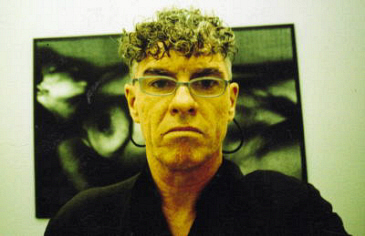“It’s a shame,” a studio exec told Variety‘s Nicole Laporte and Ian Mohr in a story about the peril of screening big-studio films at the Cannes Film Festival. “Cannes is a way to get so much exposure in one weekend and accumulate good will in the media. You work for this your whole life, and then the critics make it so awful.”
Day: May 28, 2006
Kudos to Emanuel Levy for alerting the L.A. community in unequivocal terms that Babel is Oscar-worthy and demanding of everyone’s attention, etc. Which it is.
A stunning surprise Palme D’Or winner: Ken Loach‘s The Wind That Shakes the Barley has taken the big prize, despite a nearly unanimous press consensus in recent days that the winner would be either Pedro Almodovar‘s Volver or Alejandro Gonzalez Innaritu‘s Babel.

Best Director winner Alejandro Gonzalez Innaritu
Loach’s was the first ’06 Cannes competition film I genuinely admired (I said something about it being Loach’s best in a long while, etc.) so there’s no argument from this quarter. (The N.Y. Times‘ Manohla Dargis, noting that Barley was the 13th time Loach had brought a film to Cannes, is saying “this year he got lucky.”) Loach in his acceptance speech called the film and the award “a little step in the British confronting their imperial history…maybe if we tell the truth about the past, we can tell the truth about the present.” I would have been a tiny bit happier about Babel taking the Palme D’Or, but that’s water under the bridge. The Cannes jury, indicating the strong degree of Babel support among them, handed the Best Director prize to Innaritu, as well as a special Superior Editing Award to Babel‘s Stephen Mirrione. The entire female cast of Volver (Penelope Cruz, Carmen Maura, Lola Duenas, Blanca Portillo, Yohana Cobo and Chus Lampreave) won an esemble Best Actress award, and nearly the entire male cast of Rachid Bouchareb‘s Indigenes (Jamel Debbouze, Samy Naceri, Roschdy Zem, Samy Bouajila and Bernard Blancan) won the Best Actor award. The Best Screenplay award went to Almodovar’s Volver, the Grand Prix award was handed to Bruno Dumont‘s Flandres, and the Jury Prize went to Andrea Arnold‘s Red Road.
Variety‘s Justin Chang on Guillermo del Toro‘s Pan’s Labyrinth: “…a richly imagined and exquisitely violent fantasy…a fairy tale not even remotely intended for children, this entrancing magical-realist drama concocts a sinister spin on ‘Alice in Wonderland’ against the war-torn backdrop of 1940s Spain, shifting between two worlds with striking craft and discipline . With its graphic phantasmagorical elements and Spanish-language dialogue, pic will rely heavily on strong reviews and the loyalty of del Toro’s fans when Picturehouse releases it Stateside in October.”
It’s not that I’m hostile, but I’m deeply uninterested in the low-rent culture of Mexican wrestlers and why they can’t reveal their faces by taking their douchebag masks off and how some or most of this crap fits into Nacho Libre, blah-blah. No offense to first-rate feature writer Lewis Beale, who wrote about all this for the N.Y. Times, but I couldn’t finish the piece.
More Chris Doyle-trashing-Martin Scorsese stuff, this from a fall ’05 issue of Filmmaker magazine. (Thanks to JD for passing it along.)

Cinematographer Christopher Doyle
I’m a tiny bit surprised to read that Pedro Almodovar‘s extremely fine Volver is favored to win the Palmes D’Or this evening. My reading in Cannes was that it was in a neck-and-neck race with Alejandro Gonzalez Innaritu‘s Babel, but whatever. The difference between the two is that the air starts leaking out of the Volver balloon towards the end after it “gives up the ghost”, while Babel holds true and steady all the way, and ends on a sublime and touching note.
Shiloh Nouvelle Jolie-Pitt — definitely one of those born-to-affluent-hip-parents names, but it has a nice lyrical ring to it — the other side of the valley from Jason Lee‘s naming his kid Pilot Inspektor. Brangelina’s child arrived last night — Saturday, 5.27 — in Namibia, Africa.
Hollywood Wiretap has relayed a surprising trashing of Martin Scorsese‘s modus operandi these days as well as his forthcoming The Departed, not from some renegade blogger but from the deeply respected cinematographer Christopher Doyle. Doyle reportedly spoke to Hong Kong-based writer Saul Symonds, and his comments were passed along by Grady Hendrix, who writes an Asian film blog for Variety. Doyle is quoted as saying that “it makes me very sad to see Marty and so many others genre-fying and gentrifying himself into mediocrity. Granted, mediocre is not just a Western ailment…but it would seem the disease is malign and endemic.” This is a variation of a criticism that many have thrown at Scorsese over the last ten years or so (starting with his Daniel Day Lewis doilies-and-cufflinks movie), but to hear it from Doyle, who served as visual consultant on Infernal Affairs, the Hong Kong police drama that The Departed is based upon, is more than a bit startling.
I don’t precisely recall when I started hearing good things about The Break-Up (which immediately makes my recollection a bit suspect), but it was sometime in February or March. It was vague but positive, and if you’d told me that come late May this Vince Vaughn-Jennifer Aniston dramedy (can it really be called an out-and-out comedy after Brian Lowry‘s Variety review?) would be getting slapped around pretty badly by critics and entertainment reporters, I would have said, “Really?” I’ve liked what I’ve been hearing about this thing for a long time — a fairly rough but realistic blow-by-blow of the end of a relationship. Yes, I reported some tracking figures a while back, and was criticized for saying “it’s finished” and for not reading them in context, but the numbers were the numbers and I didn’t “have it in” for the film. I hate “romantic comedies” and I’ve worshipped Vaughn’s rat-a-tat-tat schtick since Swingers. But the pile-on beatup syndrome has definitely kicked in, the two spear-points being that the Break-up is (a) too harsh and unfunny and (b) the ending is some kind of compromised fudge job. Ann Donahue‘s Premiere piece projects a $25 to $30 million opening for the film, says, having seen it, that “for anyone who has been through the thermonuclear ending of a relationship, there are a number of scenes that may strike a little too close to home.” But from what I’ve been reading about the ending, it sounds okay to me. Kate Kelly‘s Wall Street Journal piece on the film’s troubles (which I can’t link to) describes the finale as Vaughn and Aniston running into each other long after their breakup “and each on the arm of a new partner that resembles the old one.” That strikes me as life-like (people do tend to go for the same type) but not necessarily hopeful in terms of them getting back together.
Priced at only $20 bills, Ridley Scott‘s four-disc “director’s cut” DVD of Kingdom of Heaven, which streeted last Tuesday, seems like one the greatest values and bargains out there right now…an absolute must-own for folks like me, certainly. The truckloads of material seem staggering…not just Scott’s preferred 194-minute cut, which I reviewed out of a commercial showing at Laemmle’s Fairfax last January, but a motherload of extras including a three-hour, six-part documentary called “The Path to Redemption”. If the doc is anything like the one that accompanied the DVD of Scott’s Matchstick Men, it’ll be well worth it. Last January I wrote that Kingdom‘s theatrical cut “was a painterly, politically nutritious meal that felt more than a touch truncated and a bit shy of playing like a true epic-type thing. The longer cut makes it into a fuller, tastier, more banquet-y type deal…sweepier and more sumptuous and better told….certainly a finer and more substantial film. And this fact makes 20th Century Fox’s decision to release its shorter, runtier kid brother seem more than a little distasteful. Only an idiot could have watched both versions last spring or late winter…whenever it was that Fox and Scott sorted things through…and not realized that the longer version was the distinctly better film.”
